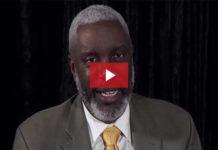“There are statements in the Bible I don’t particularly like,” Pastor Andy Stanley admits in his most recent sermon. The pastor of North Point Church in Atlanta, Georgia, who famously said that Jesus’ new covenant succeeds and therefore should replace the 10 Commandments, addressed how Christians ought to persevere in times of trial in his latest message.
Consider It Pure Joy
“What do we do when there’s nothing we can do?” Stanley addresses this question in a sermon titled “How To Persevere In Tough Times.” The preacher then unpacks a passage of James chapter 1 in which the apostle and brother of Jesus instructs those facing trials to “consider it pure joy.”
Stanley says James’ answer to trials strikes him as “too passive” and “insensitive.” Despite not liking what James is saying here, though, Stanley says “we would be fools not to take his advice.” In fact, James’ advice is particularly relevant in light of the current global pandemic and consequent quarantine orders many of us are under. Most of us can’t wait for things to get back to normal, Stanley muses, because the isolation has forced us to confront “our more sinister selves–that stuff in us we weren’t sure was there.”
In addition to having to face these less-than-pleasant characteristics in ourselves, some of us are currently facing more tangible trials in the form of job losses or health emergencies. While it may feel like James, who, Stanley explains, led the church in Jerusalem for 30 years after Jesus’ resurrection, shouldn’t be able to relate to our current predicament, he might be able to better than we think. Stanley explains that the church in Jerusalem, which would have mainly consisted of Jewish converts to Christianity, faced many trials–including financial ones that prompted the apostles to ask other churches throughout the known world for assistance. In effect, Stanley says James was surrounded by and responsible for “a community in crisis.”
Stanley contends that what James means when he instructs us to “consider it pure joy” whenever trials come our way is that “when circumstances deteriorate, artificial, counterfeit, what’s-in-it-for-me faith deteriorates right along with it.” In other words, a trial can reveal “the authenticity of our confidence in God.” It is, as James describes it, a “testing of your faith.”
True Faith and Wisdom
“Artificial, counterfeit” faith is a topic Stanley devotes a little time to in his sermon. Without using the phrase false teaching, Stanley mentions that some preachers present faith the wrong way. For instance, Stanley says “Faith is not how we get God to do stuff.” Nor is it a “super power.”
True faith, say Stanley, is “confidence that God already did something. Faith is simply confidence that God is who God reveals himself to be in the New Testament and that he will do everything he’s promised.” Rather than being something that we initiate, faith is “ultimately a response to God.”
In light of this understanding of faith, James is saying “there is joy in discovering how real our faith really is,” Stanley explains. In trials, you’re discovering things about yourself you couldn’t discover any other way, Stanley argues. “In trials, we are confronted with the authenticity–or the lack of authenticity–in our faith.”
In addition to revealing something useful, James goes on to say that trials produce perseverance by exercising our faith. “Don’t leave the gym early,” Stanley says James is essentially saying when he writes “let perseverance to finish its work” in verse four.
Stanley encourages those currently facing a trial by explaining that the very thing you may be trying to pray away is the thing God is using to produce mature faith in you. “The tension in our lives is the epicenter of God’s activity in our lives,” Stanley argues. “The only way to have grown-up faith is to face the trial as you experience God’s faithfulness in the trial.” Stanley instructs those facing a trial to ask God to use it until he chooses to remove it.
This is essentially why James instructs believers to ask for wisdom in a passage about trials. The instruction seems a little counterintuitive; Stanley admits that when he’s going through a tough time, “I don’t want wisdom. I want relief.” But this where James’ instruction makes sense if we have a proper understanding of faith. If the trials are designed to produce a mature faith in us, we should ask for wisdom to be able to see the trial as God sees it.
The Most Inspiring People
“I’m most inspired by people whose faith is tested and endures,” Stanley says. “I’m more inspired by people who get a ‘no’ from God and whose faith endures than I am by people who always seem to get a ‘yes’ from God and they live somewhat of a wrinkle-free life.”
An example of one such inspiring person is Regi Campbell, a close friend of Stanley’s and a fellow minister who passed away three months ago. “I have never seen an individual face and embrace his own mortality with more confidence and more courage and more faith than Regi Campbell,” Stanley said of his friend, who faced a medical condition (not COVID-19 related) that left his lungs unable to function.











